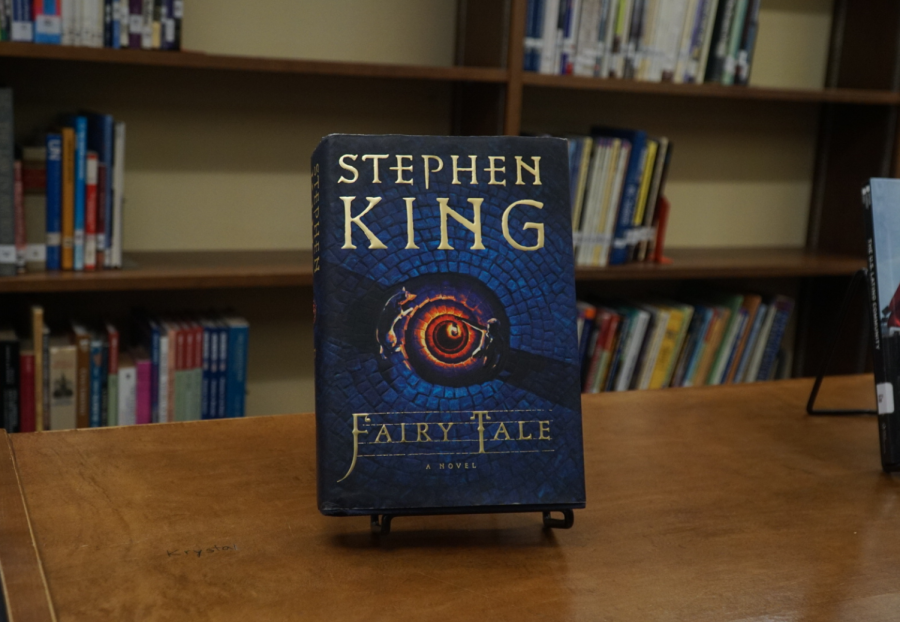King’s “Fairy Tale” is a Morbid but Brilliant Work of Imagination
Book Review
“Fairy Tale,” published by Scribner in 2022, is Stephen King’s latest dark work of imagination.
February 16, 2023
Early in the much dreaded years of COVID quarantine, renowned writer Stephen King explored the question “What would you write that would make you happy?” and his product was this novel. Its evident that “Fairy Tale” was not simply an outcome of isolation because it wasn’t some coalescence of dark and depressing imagery; rather, King’s imagination spreads its wings and breathes life into the novel’s story through an enthralling artist’s impression of a fairy tale world.
King’s twist on a classic genre had me hooked, as someone who hasn’t read even a sentence from any of his other books. Having only seen the movie adaptations of his work, I had a vague idea of the kind of style “Fairy Tale” would have, but I couldn’t have been more misguided.
Although being known mostly for creating various horror-hits and mind-boggles like “It,” “The Shining,” “The Mist,” and “Pet Sematary,” King takes a genre that he hasn’t yet explored (namely, the fairy tale) and puts his own macabre twist on it. While fairy tales are known mostly for being kid-friendly, or at least adapted to be that way, King does not shy away from his famously gruesome depictions in this story.
The novel follows a 17-year-old Charlie Reade, who lost his mother in a case of vehicular manslaughter (the accident is described in full gory detail). Charlie is a star student, plays 2 sports, both of which he excels in, and is seemingly the perfect son to his father, who becomes an alcoholic after Charlie’s mom passes away. The troubleless son is soon troubled with the unyielding weight of protecting the secret of a world connected to our own, and is then tasked with saving its people from an ancient evil buried beneath its poppy-covered fields.
Despite the crowning point in “Fairy Tale” not developing fully until a quarter of the way through its six-hundred pages, the novel felt far from a burden to read. King uses his time wisely and builds up mystery and suspense by slowly teasing his Narnia-esque fairy tale world throughout this justifiably long prologue. Even in this slow jog to the climax of the story, the cast of diverse characters, each with their own set of unique and fresh traits, keeps your attention grasped and your imagination flowing.
The way characters interact, not just with Charlie, but with each other throughout the story gives the sensation that what you’re reading isn’t just a book but a living, breathing world. Every person throughout has their own special way of fitting into the main plot, and all of the gears turn well right up to the book’s satisfying end.
Alongside a brilliant composition of distinctive roles, King creates a world of conundrums left for the reader to explore as they dive deeper into the pages. Cities dark and in ruin, reminiscent of New York in “I Am Legend,” landscapes and characters filled with King’s surreal, sometimes unsettling imagination all complement the story at hand. Worldbuilding throughout the book rewards the attentive reader with detailed descriptions of his distinguishable and crafted landscape.
Although it may not be as complex or mind-bending as I’ve heard much of his other works are, “Fairy Tale” doesn’t need complexity to be not only a good read but one that sits with you even after you’ve finished reading it.
I’ve heard some of King’s work ends abruptly or unexpectedly, but I’d encourage anyone who can stomach some grotesque imagery and mature themes to read “Fairy Tale” to its own resolution. King sells the dark fairy tale he’s pitching, and even though I had next to no idea what I was walking into, after reading through this story of blasphemy, bigotry, and fantasy, I would recommend most take a step into it as well.




